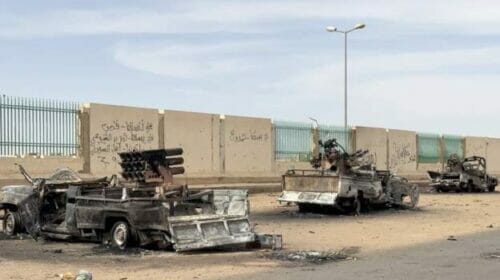Hillary Clinton Calls on al-Shabaab to Allow Assistance in Somalia
QUESTION:Do you think that there’s not enough international outrage about this? I mean, the U.S. has had trouble at the United Nations pushing for even stronger condemnations, such as a resolution. I mean, are you hampered by what you can do by the lack of international will on this?
SECRETARY CLINTON:Well, let me say this, Elise. We are working very hard to increase that international will. What happened last night in the Security Council could not have happened a week ago. So in effect, other governments, other people’s voices are starting to be heard, and we think that’s essential.
MR. TONER:Next question goes to Paul Workman of CTV.
QUESTION:Thank you. Secretary Clinton, first of all, I’m wondering if we could talk about the Keystone Pipeline and why the delays in coming to a decision and what concerns you might have about the importation of what’s been called “dirty oil” into the United States.
And for Minister Baird – and both of you, actually – on Somalia, first of all, did you talk about military action against al-Shabaab? And on Libya, would either of you accept to have Qadhafi stay in the country if he steps down? And what do you think of this latest report that he may want to join with the Islamists in order to drive the rebels out?
SECRETARY CLINTON:Well, I will answer your first question, and I will let the minister answer your next three. (Laughter.)
FOREIGN MINISTER BAIRD:That’s called a partnership. (Laughter.)
SECRETARY CLINTON:We are reviewing TransCanada’s permit application for Keystone XL Pipeline to cross the U.S.-Canadian border. As you know, this includes analysis and assessment of multiple factors, as well as reviewing hundreds of thousands of comments that have been received during the public comment period. We are leaving no stone unturned in this process and we expect to make a decision on the permit before the end of this year.
FOREIGN MINISTER BAIRD:On the Keystone Pipeline, this is obviously tremendously important to the future prosperity of the Canadian economy. We had a good discussion about it, and I respect that the Secretary is the decider, so she listened respectfully. We’re pleased that there’s a – the recent announcement about the process, that there will be some public consultation, and obviously look forward to a decision on this. It is a very important project not just for our government, but I think for Canadians and the future of the Canadian economy.
I think while we’re deeply concerned about al-Shabaab’s actions in Somalia at this time, we’re not contemplating military action. Obviously, both countries have an experience from that, some 16, 17, 18 years ago.
With respect to Colonel Qadhafi staying in Libya, I believe when I visited Benghazi the bottom line of the NTC was that he and his family had to leave power. Certainly, we’re supportive of that as a minimum. At the end of the day, though, a post-Qadhafi Libya should – those decisions should be made by Libyans themselves, but I appreciated the comments of the NTC when I visited Benghazi in that regard.
MR. TONER:Next is Kirit Radia of ABC News.
QUESTION:Hi. Thank you very much to you both. Madam Secretary, before I get to my question, I’d like to just follow up on Elise’s question, because I —
SECRETARY CLINTON:(Laughter.) I warned John before we came out here that two plus two did not equal four. (Laughter.)
QUESTION:Well, Canada is double the allies. (Laughter.)
QUESTION:That’s right. But I would like to ask you just about whether or not to call on President Asad to go, why not do that?
My question was about Somalia, following on your comments. The recent UNICEF appeal for $300 million has only yielded a couple million dollars contributed so far. What are you saying to allies, to other countries around the world, to try to get them on board? And recently this week, several officials have suggested that the U.S. would be open to some sort of agreement working with al-Shabaab, or elements of it that would be willing to cooperate if they were to allow some aid in. What can you tell us about that? Thank you.
SECRETARY CLINTON:Well, first, as to the follow-up on Syria, I think I’ve said all I can say, that we are working around the clock to try to gather up as much international support for strong actions against the Syrian regime as possible. I come from the school that actions speak louder than words.
Now with respect to Somalia and al-Shabaab, I want to put this in the broader context. Millions of people are suffering, and those millions of people are in Ethiopia and Kenya; they are in parts of Somalia that are not controlled by al-Shabaab. So there is more than enough work for the international community to do to help save lives without even having to worry about the al-Shabaab controlled areas. So of course, I urge a response to the UN’s appeal.
The United States is now approaching half a billion dollars in support for famine relief, and we have communicated, I have spoken directly with Prime Minister Meles. We have spoken with the Kenyan Government. We are working with a lot of the UN and multilateral organizations as well as the NGOs to try to better organize to deliver the food stuffs that are necessary, particularly to save children’s lives from this famine that they’re encountering.
With respect to al-Shabaab, what the United States has done in the last week is to make it clear our understanding of how difficult it will be to get aid into the al-Shabaab controlled regions. Therefore, we know that al-Shabaab imposes taxes on people who try to bring aid to assist in saving lives from this drought and famine. We know that they make money from kidnapping those who are attempting to provide humanitarian relief. We know how difficult this is. Therefore, we don’t want to add to the difficulty.
If people from the UN or from other organizations are trying to get food into the al-Shabaab controlled region, the United States will not be imposing the penalties that are called for under our laws, particularly, as you know, the Patriot Act, which talks about any material support that goes to terrorists. And if it inadvertently does go to al-Shabaab, we think, unfortunately, the situation calls for us to offer some room for more maneuverability in trying to get the food in. At the end of the day, the best way to get food into those areas is for al-Shabaab to actually care about the people under their control.
MR. TONER:The next question is (inaudible) from Radio-Canada.
QUESTION:Thank you very much. (In French.)
And for Madam Secretary, I’d first like to follow up on my colleague’s question regarding Keystone and what your concerns are for the environmental impact of the extraction of oil from the oil sands. And the question I asked the minister on the differences, really also, and policies between the actions in Libya and the ones in Syria. Can you explain those differences, please?
FOREIGN MINISTER BAIRD:Listen. I mean, obviously, the United Nations Security Council passed Resolution 1973, which gave a significant amount of leeway for allies to come together and to tackle the challenge that we saw on the ground, we’re there very actively protecting civilian lives.
The situation in Syria, the actions of the Asad regime are obviously abhorrent. The way they’ve acted in recent weeks and months, even in the last 48 hours in Hama is absolutely disgraceful. Regrettably, we don’t have the same amount of international support at the UN for this, so I think in the absence of that, what we’ve got to continue to do is to work with like-minded allies. And there’s not a – there’s no country, I think, who can single-handedly tackle this challenge. We’ve got to work aggressively with others.
I think recently Canada, the United States, the United Kingdom have toughened up our sanctions, and we had a good discussion today about what we could do going forward.
QUESTION:(Inaudible.)
FOREIGN MINISTER BAIRD:Ah, excuse. Do you want to do the French answer? (Laughter.)
(In French.)
SECRETARY CLINTON:I would only add to John’s comments about Syria versus Libya. As he pointed out, the response from the international community was very different with respect to Libya, not only with, first, UN Security Council Resolution 1970, but then 1973. You had a call for action to protect civilians from the Gulf States, from the Arab League. So I think that there may be many reasons for it, but the step that we did see made last night in the Security Council is the first step of what we hope will be continuing steps to try to unite the world in both our rhetorical outrage, but in actions that will send a very clear message to the Asad regime, the insiders there, that there’s a price to pay for this kind of abuse and attacks on their own people.
With respect to Keystone, we are planning to issue the final environmental impact statement this month. Then once that final statement is issued, interested in federal agencies on our side, including the Department of Energy and the Environmental Protection Agency, under our laws have a 90-day period to review and provide their views on whether a permit should be issued. We think it’s critically important to hear the publics’ views, and so the State Department in September will host public meetings in all six of the states through which the Pipeline will pass.
We’ve been clear from the beginning that the safety of the Pipeline is one of our highest priorities. We have not only conferred with the EPA, but also with an organization called the Pipeline and Hazardous Materials Safety Association. And we have worked diligently to ensure we have full understanding of all of the consequences, including the very important point that the minister made to me about energy security and what that means for our two countries. And we have worked with the applicant, with TransCanada, to develop a set of conditions above and beyond what is required by law to ensure that if the permit is issued, the project will be as safe as it could possibly be.
But because I am very conscious of the role that I play and that the State Department plays, that is as full an explanation as I can provide.
Thank you all very much.



